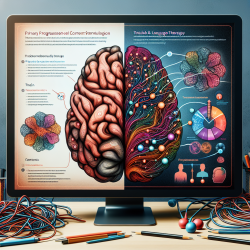As a speech-language pathologist, it's essential to base our interventions on robust data and evidence. The study titled “It’s Like Stealing What Should be Theirs.” An Exploration of the Experiences and Perspectives of Parents and Educational Practitioners on Hebrew–English Bilingualism for Jewish Autistic Children, offers invaluable insights into the benefits of bilingualism for autistic children. This research provides a data-driven perspective that can significantly enhance our practice and the outcomes for the children we serve.
Key Findings and Implications
The study revealed several critical points that practitioners should consider:
- Monolingual Approaches are Unjust: Both parents and practitioners felt that advocating a monolingual approach was an injustice, depriving children of their cultural and religious heritage.
- Hebrew Facilitates Integration: Learning Hebrew aids in multifaceted integration, allowing children to participate in religious and cultural activities, thereby fostering a sense of belonging.
- Positive Identity Formation: Mastering Hebrew contributes to a positive identity and empowerment for autistic children, enhancing their self-esteem and sense of achievement.
- Religious Observance Influences Language Learning: More religious families place a higher emphasis on learning Hebrew, viewing it as crucial for maintaining cultural and religious continuity.
- Importance of Primary Language Proficiency: While bilingualism is beneficial, ensuring proficiency in the primary language (English) is critical, especially for societal engagement.
Practical Recommendations for Practitioners
Based on these findings, here are some practical recommendations for practitioners working with bilingual autistic children:
- Promote Bilingualism: Encourage parents to maintain bilingual environments. Research shows that bilingualism does not cause additional language development delays and may offer cognitive and social benefits.
- Cultural Sensitivity: Understand and respect the cultural and religious significance of the heritage language. This understanding can foster better communication and trust with families.
- Individualized Approach: Assess each child's capability in their primary language before introducing a second language. Tailor interventions to meet the unique needs of each child.
- Provide Support and Resources: Offer resources and support to parents and educators to facilitate bilingual education. This can include training, materials, and community programs.
Encouraging Further Research
The study underscores the need for further research in diverse linguistic contexts and among different ethnic communities. Understanding the unique challenges and benefits of bilingualism in various settings can help refine our approaches and improve outcomes for autistic children globally.
To read the original research paper, please follow this link: “It’s Like Stealing What Should be Theirs.” An Exploration of the Experiences and Perspectives of Parents and Educational Practitioners on Hebrew–English Bilingualism for Jewish Autistic Children.










